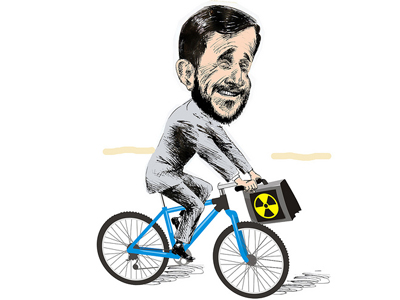Iran Sanctions Leakage
Proponents of sanctions are too optimistic. Economic pressure will not cause Iran to give up its nuclear program.
 There is an emerging consensus that the international economic sanctions against Iran are causing serious pain to the clerical regime. The principal disagreement among Western pundits and policy experts is whether the sanctions will bite deeply enough and soon enough to thwart Tehran’s nuclear ambitions.
There is an emerging consensus that the international economic sanctions against Iran are causing serious pain to the clerical regime. The principal disagreement among Western pundits and policy experts is whether the sanctions will bite deeply enough and soon enough to thwart Tehran’s nuclear ambitions.
But there is growing evidence that the effectiveness of the sanctions themselves may be overrated. Caution about the prospects of a successful outcome is warranted for several reasons. First, we’ve heard the confident claims before that restrictions were causing severe economic dislocations in Iran, resulting in major pressure on the regime. Indeed, such claims were prominent during the Bush administration. Clearly, that optimism was misplaced, or advocates of a coercive policy would not have had to push for new rounds of sanctions. Time will tell whether the optimists are finally right or whether the latest pronouncements are just another false dawn.
Second, the historical record shows that sanctions fail more often than they succeed. That is especially true when they are designed to compel a target regime to abandon a high-priority, high-prestige objective. The issue is not whether sanctions inflict pain on the general population in that country. Measured in that fashion, the tactic always works, since ordinary people—especially the poorest, least powerful—do suffer, often badly. The real issue, though, is whether the country’s economic and political elites are so discomfited and weakened that they are willing to capitulate regarding the issue in dispute.
It is rare that elites cannot insulate themselves from the impact enough to avoid having to make unpalatable concessions. Moreover, even elites will endure considerable pain to avoid giving up a high-priority policy. And there is little question that the nuclear program is an extremely high-priority goal for Iran’s political elite.
Finally, sanctions have an especially anemic record of success without comprehensive international cooperation. That aspect also raises serious doubts about the effectiveness of the Iranian sanctions to this point and going forward. China and Russia have a long record of foot-dragging about imposing sanctions on Tehran, and both countries retain important economic links with Iran despite the tightening international restriction.
Beijing’s reluctance to go along with the policy Washington favors is understandable. Iran is a significant supplier of energy to China’s voracious economy, a factor that is already important and will become more so as the Chinese economy continues to grow. An anti-American Iran also serves as a brake on U.S. hegemony in the oil-rich Persian Gulf. The other major oil producers in the region, Saudi Arabia, Iraq and the small Gulf states, are all close U.S. allies or are at least under significant U.S. influence. Iran’s role as a counterweight makes both Moscow and Beijing extremely wary of going along with Washington’s anti-Iranian agenda.
But the leakage in the sanctions system is not confined to the actions of Russia and China. Even key U.S. allies such as Japan and several European Union countries have not entirely severed their commercial links to Iran. And India seems to be almost ostentatiously flouting Washington’s wishes. A major Indian trade delegation visited Tehran recently and came away extremely pleased with the outcome.
There are few signs that India will reduce its $11 billion a year imports of petroleum from Iran. The international sanctions have largely cut off Iran’s banks from the global banking system, but all that has done is force India and other purchasers of Iranian oil to use a barter system. Beyond the petroleum sector, India’s influential manufacturing lobby sees a great opportunity to fill the vacuum created by the decline of Western exports to Iran.
At a minimum, those factors suggest that New Delhi will continue to be a reluctant, unreliable participant in the sanctions system. Indeed, the Obama administration just excluded India (as well as China) from the list of countries that have reduced their oil imports from Iran sufficiently to be exempt from Washington’s own sanctions.
Leakage from a sanctions system is quite substantial whenever two of the top economic powers in the world are not fully on board. That certainly seems to be the case with the current sanctions against Iran.
Relying on sanctions to pressure Iran to relinquish its nuclear ambitions is preferable to the reckless proposals of hawks who seemingly can’t wait to bomb that country. But proponents of sanctions are being too optimistic about the efficacy of their strategy. The odds are that economic pressure will not cause Iran to abandon its nuclear program. It is time to start thinking about a “Plan C” to deal with the prospect of a nuclear-armed Iran.
Image: osipovva
